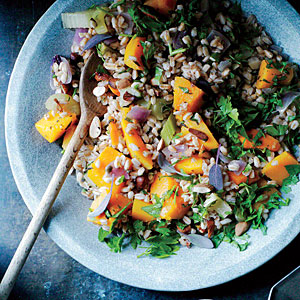By: Rebecca Coleman, RD
The holidays are a special time of year, filled with decorations, music, family and friends, and food, and typically lots of it. Busy schedules, holiday celebrations and extra treats can contribute to weight gain for many Americans.
While I’d certainly never suggest that you cut the food out of your celebrations, there are many ways to make your holiday fare healthier. Here are a handful of healthy holiday hacks:
1. Cut the fat. Oil, butter and cream are common ingredients in our most beloved recipes, however they add substantial calories. Each gram of fat has nine calories, which is more than double the calories in protein and carbohydrates (four calories per gram). In just one tablespoon of butter, there are about 11 grams of fat, or 102 calories. So how can you reduce fat and calories in your holiday meals?
- Use plain fat-free yogurt or low-fat sour cream in place of regular sour cream. Try it in this Green Bean Casserole.
- Reduce the butter and add fresh flavors such as herbs, spices, zest and fruit juice. This Spiced Sweet Potato Casserole is a great example.
- And rather than deep frying, get an oil mister to keep foods from sticking, while limiting the amount of fat the foods will absorb. These Potato Latkes are less than half the calories of a traditional latke, but are full of flavor.

2. Don’t go against the grain. Incorporating whole grains can help increase satiety and pump up the fiber, vitamins and minerals in a dish. Use whole grain or whole wheat bread in your stuffing, whether you’re making the swap in a family favorite recipe or testing a recipe similar to this Triple Mushroom Stuffing. Or, go non-traditional and give this Farro Stuffing with Butternut Squash a try.
3. Eat your veggies. Numerous holiday side dishes are baked in a casserole dish with butter, sour cream or cheese. Why can’t we eat veggies in a simpler form to help fill up and save calories in the long run? Think outside the casserole and serve your friends and family a fresh, colorful salad, such as this Winter Salad with Roasted Beets, or roast up a batch of these Cranberry Roasted Winter Vegetables. Not only will these dishes make your table look festive, but your healthy alternative may just become a new tradition.

4. Snack smart. Snacking is a large contributor of calories in the American diet, a reality that only intensifies during the holidays with gatherings and busy schedules. Making healthy snack choices can help save calories and weight gain in the long run. So rather than bringing veggies and ranch, a snack perceived to be on the healthier side, to serve at a party. Whip up a batch of this Black Bean Hummus to accompany your veggies instead. A three and a half tablespoon serving will save you eight grams of fat and add five grams of protein when compared to two tablespoons of ranch dip. Another dish sure to become a quick favorite is these Baked Mozzarella Bites, which cut out excess calories and fat.
5. Stay hydrated. Water is essential for numerous metabolic processes, helps clear our body of waste and prevent brain and muscle fatigue. Because water is so essential, signs of dehydration can closely mimic those of hunger, causing us to overeat. A quick and basic calculation for estimating how much fluid you need is: half your body weight (pounds) = fluid needs (ounces).
Achieve your water goal by keeping a water bottle handy everywhere you go. If you want to jazz up your water intake, make a pitcher of Raspberry Lime Infused Water or sip on some Orange, Lemon and Basil Infused Water. By filling up on these, you’ll help prevent overeating and be less likely to reach for a sugary beverage instead.
While it may seem like a shame not to make your favorite casserole just like grandma always did, you may discover that some slight modifications can evolve into new traditions, and help you and your family celebrate smarter and healthier this holiday season.
About the Author: Rebecca Coleman, RD, is a registered dietitian and Health and Wellness Coordinator in the Wellness Department at Priority Health. She is passionate about helping families and individuals improve their health through nutrition education and nutritious food access. Rebecca is certified in adult weight management and has a background in both clinical nutrition and wellness programming.


